Studying Go in Korea
In September 2022 I went to South Korea to study Go for a month. For the audience of this blog, I usually need to specify: Go the board game, not Go the programming language. In the western world, the game is called using the Japanese term Go (碁) but for the remainder of this blog post I will use the term Baduk (바둑) since I was in Korea. If I was in China, I’d call it Weiqi (围棋).
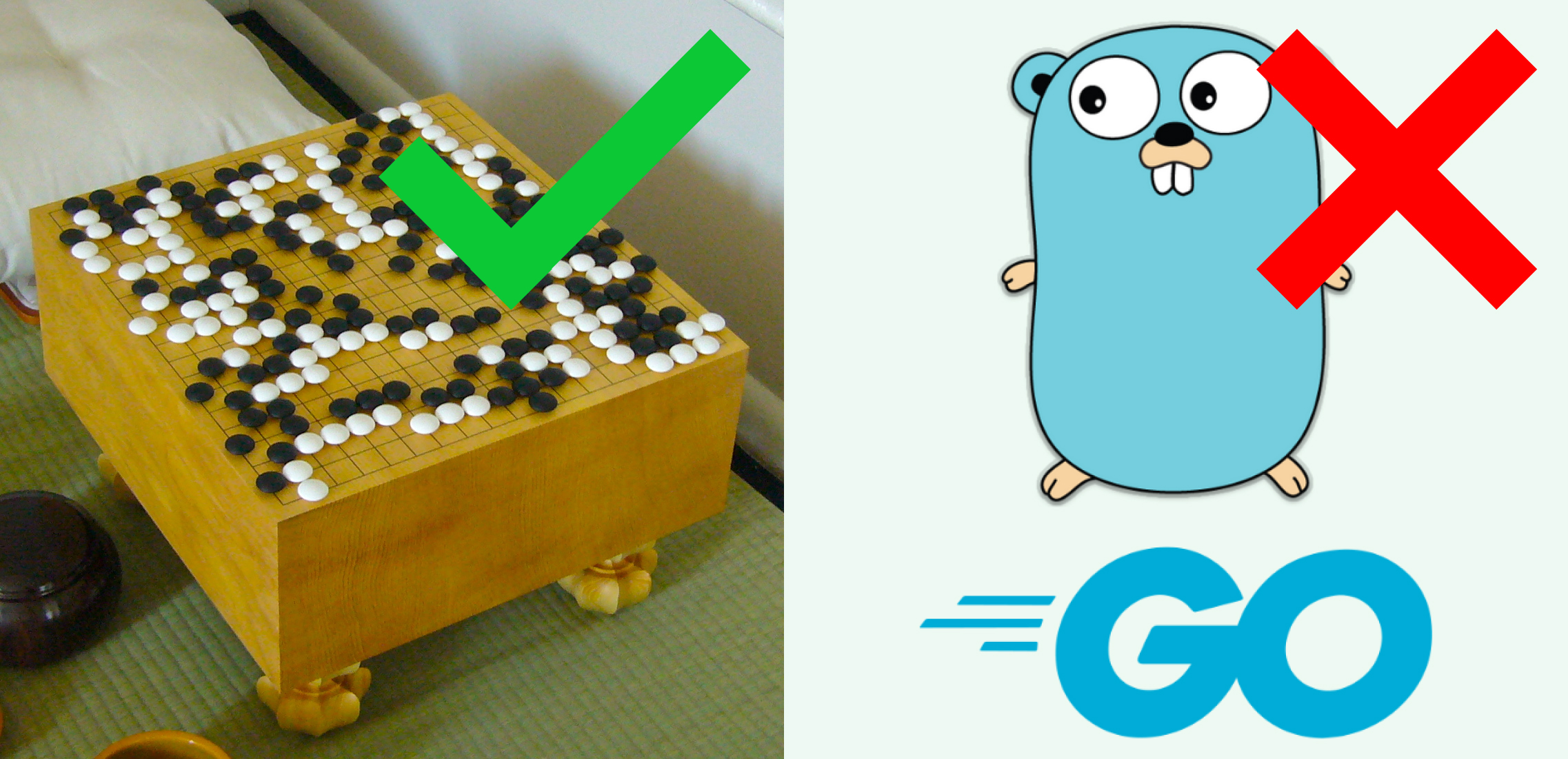
Where in Korea did you go to study baduk?
Fortunately I had a starting point that didn’t require me to know how to speak Korean. I went to Blackie’s International Baduk Academy, which is a baduk school specifically for foreigners. Kim Seung-jun (Blackie) 9P and Diána Kőszegi (Dia) 1P are the teachers.
Accommodations are provided and you live with the other students/teacher. As such, baduk wasn’t just classes I had to attend at certain hours of the day, but rather it was the entire experience. We also weren’t in Seoul proper but rather, in the suburbs at the edge of Seongnam/Gwangju. That being said, the teachers had a mini-van and we drove to Seoul quite often. It was quite impressive, it could fit up to 10 people and we even got to zoom past all the morning traffic by taking the bus lane (minimum 6 passengers).
Why Korea?
I believe there used to be places in Japan or China that foreigners would go to study pre-covid, but neither countries were open for travel (Japan opened at the tail end of my trip, and China well, lol).
How did you find the school?
At some point when I started playing, I figured it would be good to get direct feedback once in a while. So I looked for instructors online. And you see, when you look for english-speaking baduk teachers on Google, there is a limited number of search results and it doesn’t take long to find all of them.
What was the occasion to take a whole month to study?
I’m basically a dinosaur fossil at this point.
But seriously, my employer (Figma) has a sabbatical program where you get to take an extended leave after you’ve been there for 5 years (this is considered a long time in tech industry where the average tenure is two years). I used half of it for baduk.
Did you know baduk already?
Yes, I’m not an expert but not a beginner either. I had a lot of free time to play/study during the pandemic before we got vaccinated and there was nothing else to do. I had been going to the Berkeley and San Francisco go clubs on occasion. I’m about 3 kyu — for those of you who don’t know what that means, it’s something like “mid-advanced intermediate”. I was still the weakest player at BIBA, but your strength doesn’t really matter. There’s no entry tests to get into BIBA, you just email them and ask if you can come. The school seeks to promote baduk among foreigners, not produce professionals.
What was a day like?
It depends on the day.
On many (perhaps even a majority?) of days, there was something on the schedule. Examples:
- Going to the Hanguk Kiwon (Korea Baduk Association/KBA), which is also the TV set where they play and televise official matches like you might watch on Baduk TV. The teachers are professional players themselves, so they have official matches around once a week. While the teacher is playing, we are in the backroom reviewing the game.
- Going to academies where kids (in some cases, yunguseng) where they find kids our level to play against. Afterwards, the teacher review the games.
- Similarly, arranging team matches with players at clubs for middle-age/older Korean guys.
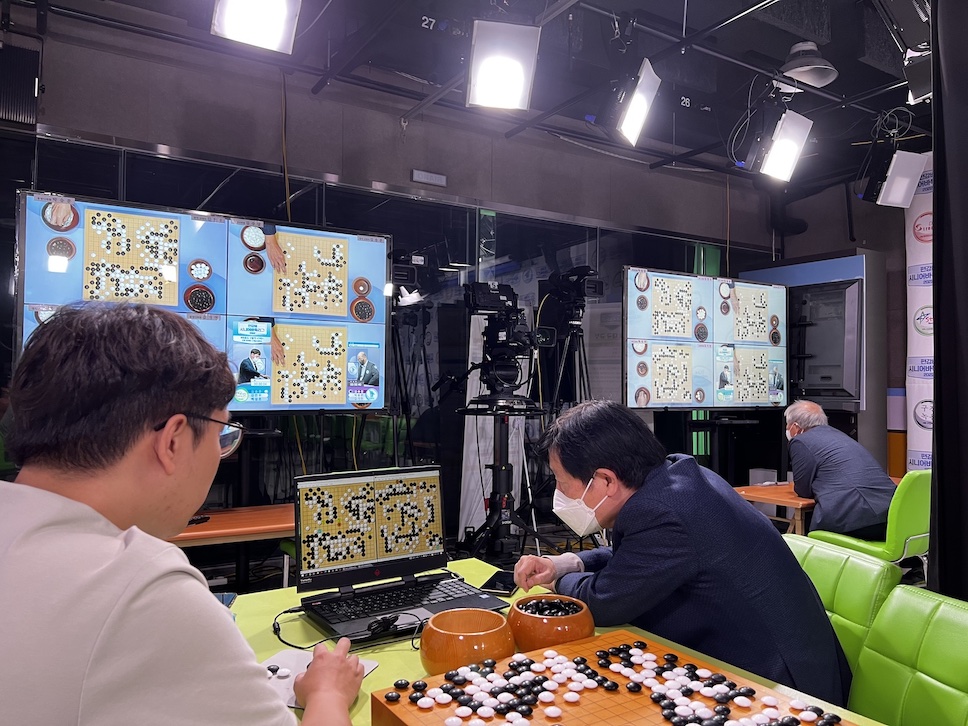
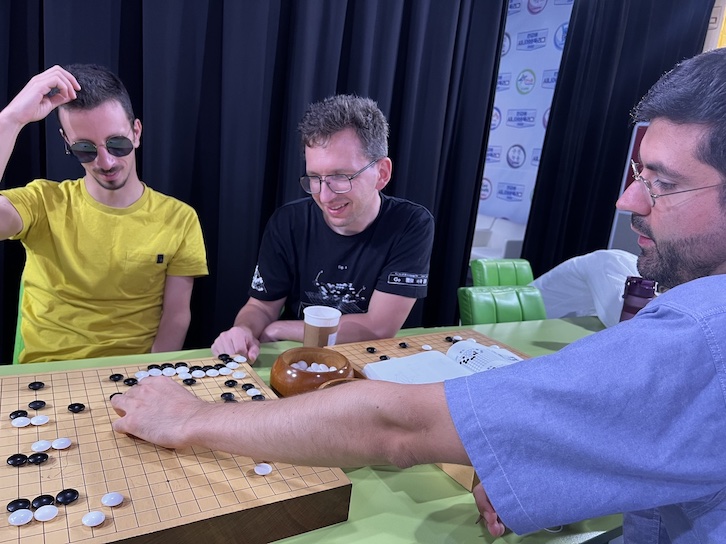
KBA back room
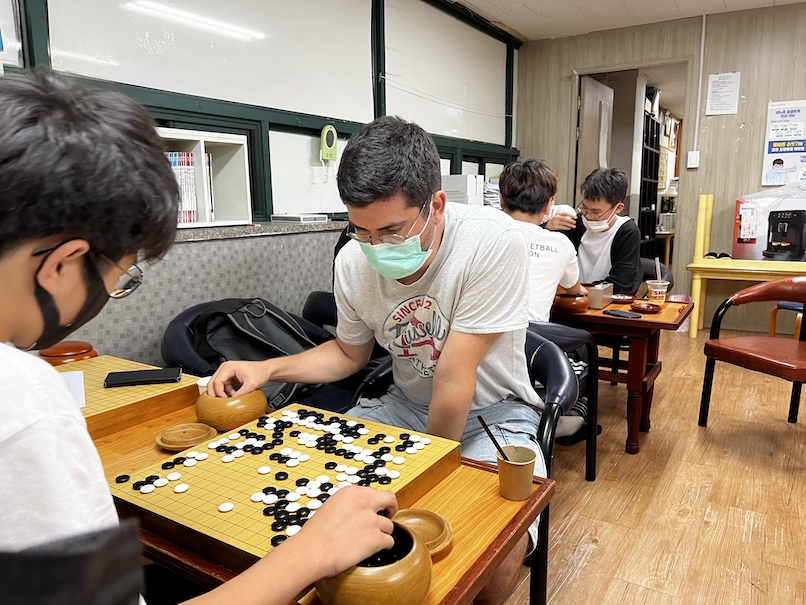
Academy of aspiring pros
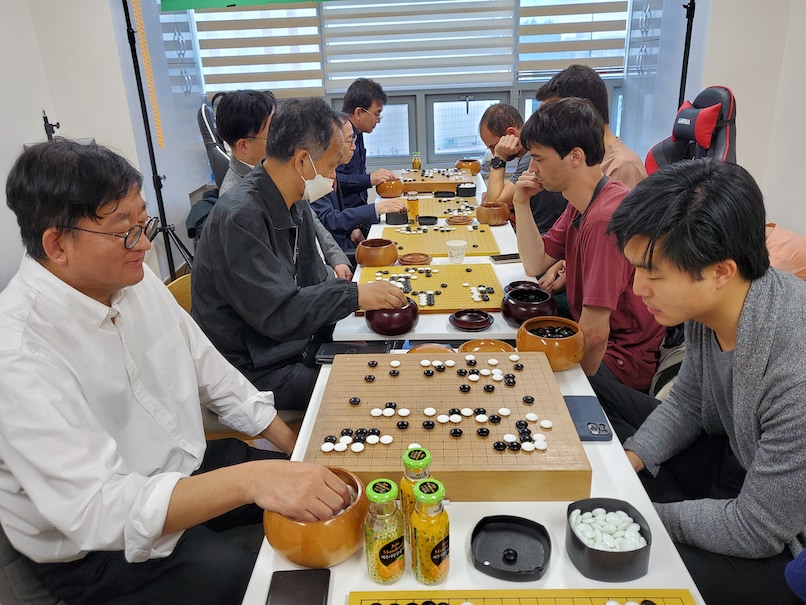
BIBA students v.s. Korea amateur players
On other days, it’s generally studying on your own and playing games with the other students. The teachers will provide problem sets on demand and correct the answers, but the amount and intensity of studying is largely up to you.
A typical day didn’t start until early afternoon — early morning was a good time to self-study. In the evening, it was typically board games (the Catan type) or eating/drinking/poker in Seoul.
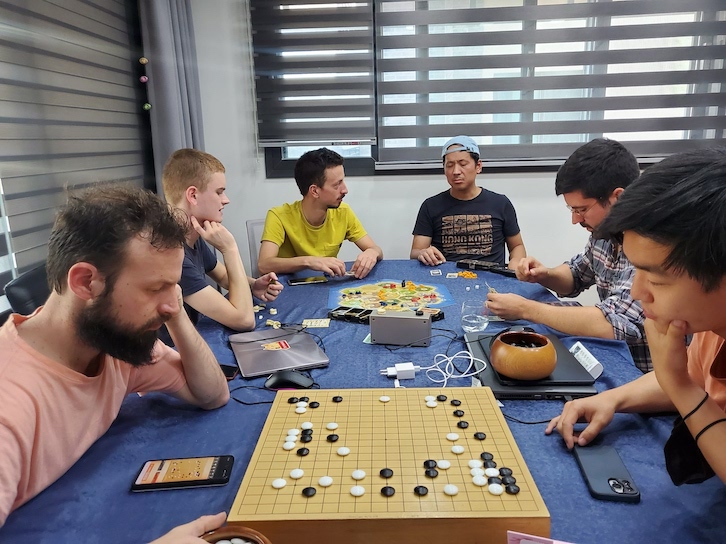
An evening at home
KPMC
The Korea Prime Minister Cup, a world amateur tournament was held while I was there which was timely.
I was not my country’s representative (Canada has too many strong players), but I got to sneak in since the teachers were working at the tournament as english-speaking professional commentators/game reviewers. This way, I got the chance to meet a lot of top amateurs and play against the representatives of some countries that were around my level in the after-hours.
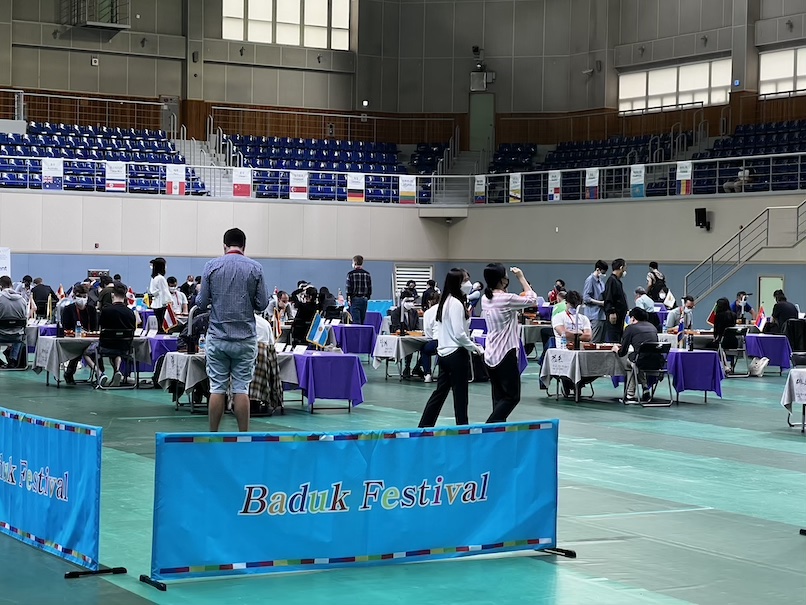
During the tournament -- if you look closely, you'll see Yoonyoung working as the head referee next to Lee Yujin
Funnily, I managed to get myself a “job” while there. They needed some extra people who understand the game to record the games while they were being played for the purpose of livestreaming to the the Internet, so here’s me with an official vest, and a link to a game I recorded, Belgium v.s. New Zealand.
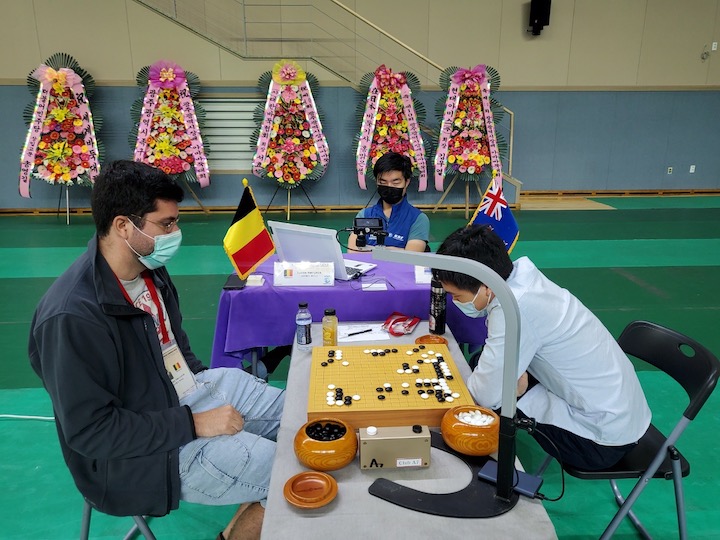
Who were the other students?
Most of the other students this year were their country representatives for KPMC, and wanted to stay a few extra weeks in Korea before/after the tournament. There was only me and a Russian teenager who were not there for KPMC. The party grew quite large, at peak I think we were around 8 students. In terms of age, the mode was around 25-30 with the youngest being 14 and the oldest being in their 60s.
Funnily, there was a significant French-speaking contingent there, between myself (from Quebec), the Canadian rep (also from Quebec), the French rep, the Belgian rep, a former BIBA student (also from Quebec) and some friends of BIBA (from France) who occasionally showed up so we spoke French a lot.
What are some highlights?
The best part about being part of a baduk school and being there around KPMC is that I got to meet a lot of professional and top amateur players. There are only about 400 or so baduk professionals in Korea, most of whom have been studying in baduk schools since a young age. It’s a close-knit community, kind of like how tech people befriend other tech people but even moreso. As such, we met a lot of other pros via the social circles of the teachers and went drinking/bowling/etc.
This gives a glimpse into the life of a baduk professional, not as those monstrously skilled players, but as humans with aspirations (such as travelling, getting better at english) and who effectively work as freelancers. Being a baduk pro in Korea is not really a job so much as a title. It gives you the ability to play in tournaments (and be paid), but otherwise it’s up to the individual to figure out what to do with it.
Other than that, some notable moments involving recognizable names:
- I got to play against Choi Cheolhan, who was the former #2 in Korea during the time of Lee Sedol. From my understanding, he was just being a dad that day and bringing his kid outside. But his son was the strongest 5-year old in Korea, and was actually about my level, so the teachers had us play against each other. I won, but I will almost certainly get crushed if I play him again in a few months. I guess that earned me a free a teaching game against Choi Cheolhan, which was quite lucky! Normally, it’s hard to get a game against the more famous players (or at least, it’s quite expensive).
- At KPMC, there was a pair-go side tournament that anyone could play in (including the pros, referees, etc). I played with Yoonyoung Kim, one of the few english-speaking baduk content producers, against Javier from Finland and Kenyi from Peru.
- Robert van Zeijst, the Dutch representative and author of many Go books hung out with us at BIBA after the tournament.
- Being around the KBA a lot, we saw notable people just pass by, like Lee Changho (former #1, ~1990-2005), Choi Jeong (current female #1), Byun Sangil (current #2). We didn’t see Shin Jinseo, but I did get a face mask and a cup with his face on it.
- Lunch with Haewon Han and Eunkyo Do and learned more about their backgrounds as baduk pros.
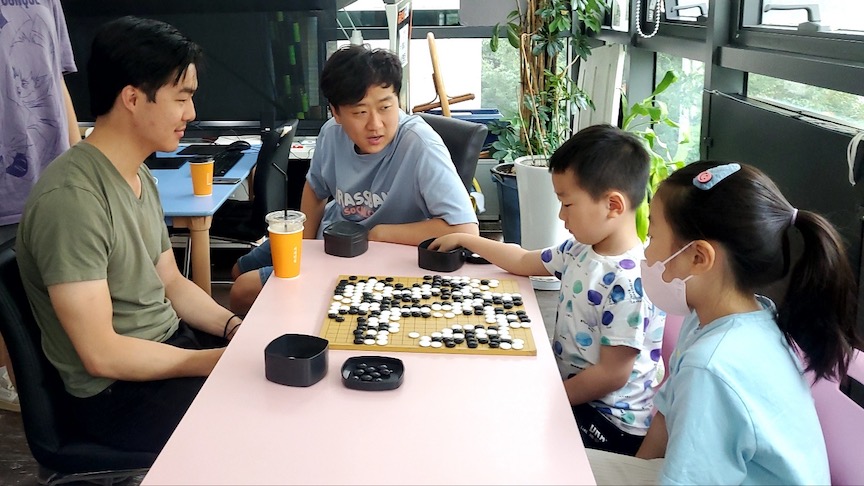
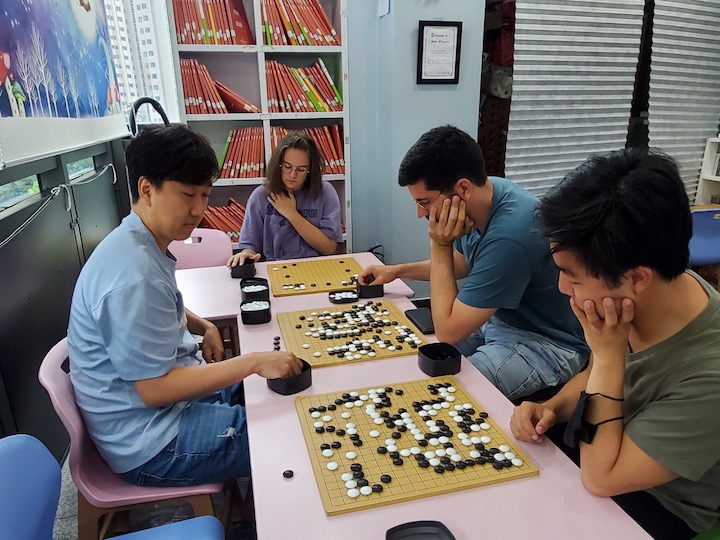
Me v.s. Choi Cheolhan's son and simul with Choi Cheolhan
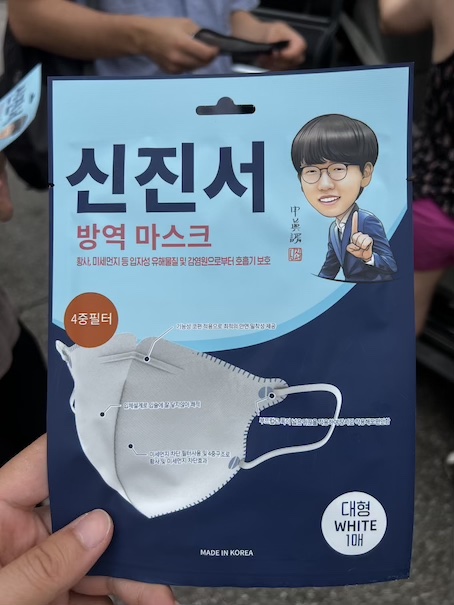
A mask to give you power
Was it what you expected?
Unlike many of the other students who learned about this school from word-of-mouth, I went in completely blind, so I didn’t have very set expectations. That being said,
- It was a more immersive than I expected and I didn’t think that I’d get to meet so many new people throughout the professional & amateur community
- The days were a little bit less structured than I expected
- But we went out to visit a lot more places than I expected
- There was not much touristing Seoul (which is fine, I’ve visited before)
Overall, it was a great experience! The opportunity to meet so many people was inspiring.
Did you become stronger?
This one is hard to say. The dan players at the SF Go Club said my opening has improved, and I certainly increased my “vocabulary” of moves while at BIBA. On the other hand, I didn’t play online much while at BIBA or after (urgh, circumstances, I’ve been very busy after coming back to the US) so it’s hard to say if my rank changed.
Like most foreigners, my weakest area is raw reading ability which can only be fixed with large volumes of problem sets, which implies heads down in the library studying. However, going to BIBA certainly increased my motivation to do so, and to be more involved with the go community at large.
Can I go to BIBA too?
Just email them! Though they are no longer open year-round like they used to, Blackie and Dia have expressed interest in opening it again next year.
They also teach online and can connect you with young upcoming Korean pros.

